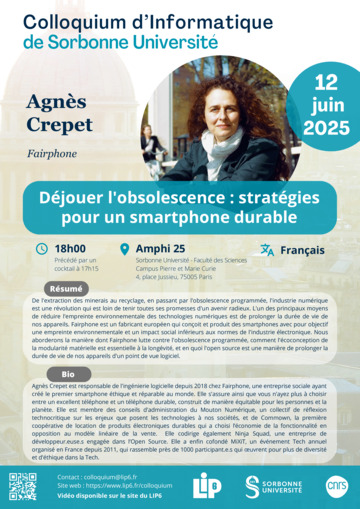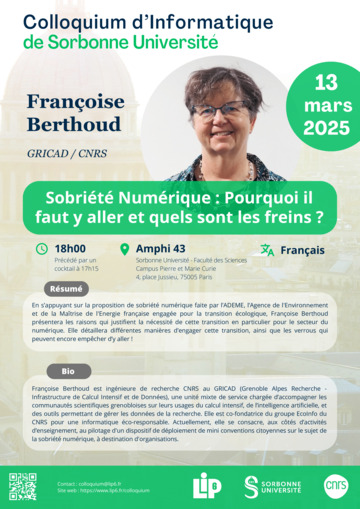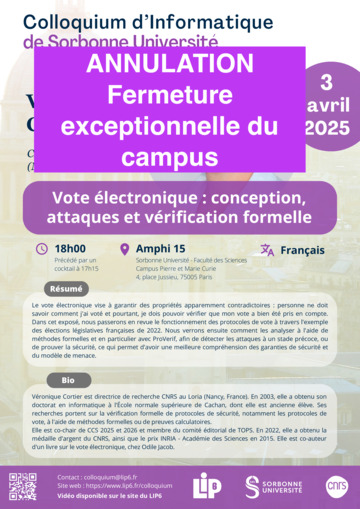Colloquium d’Informatique de Sorbonne Université
Frans Kaashoek, Massachusetts Institute of Technology
Четверг, апрель 18, 2013 18:00
Campus Pierre et Marie Curie, Bâtiment Esclangon, Amphithéâtre Durand, Sorbonne University - Faculté des Sciences
The multicore evolution and operating systems
Frans Kaashoek is a full professor in MIT's EECS department and a member of Computer Science and Artificial Intelligence Laboratory, where he coleads the parallel and distributed operating systems group (http://www.pdos.csail.mit.edu/). He received a PhD (1992) from the Vrije Universiteit (Amsterdam, The Netherlands) for his work on group communication in the Amoeba distributed operating system, under the supervision of A.S. Tanenbaum. Frans's principal field of interest is designing and building computer systems. In collaboration with students and colleagues, his past contributions include_once the exokernel operating system, the Click modular router, the RON overlay, the self-certifying file system, the Chord distributed hash table, and the Asbestos/Flume secure operating system. Frans is a member of the National Academy of Engineering and the recipient of several awards, including the inaugural ACM SIGOPS Mark Weiser award and the 2010 ACM-Infosys Foundation award. He was a cofounder of Sightpath, Inc. (acquired by Cisco systems Inc.) and founding board member of Mazu Networks, Inc. (acquired by Riverbed Inc.).
Multicore chips with hundreds of cores will likely be available soon. Although many applications have significant inherent parallelism (e.g., mail servers), their scalability on many cores can be limited by the underlying operating system. We have built or modified several kernels (Corey, Linux, and xv6) to explore OS designs that scale with increasing number of cores. This talk will summarize our experiences by exploring questions such as what is the impact of kernel scalability on application scalability, is a revolution in kernel design necessary to achieve kernel scalability, and what limits kernel scalability.
About
Launched in 2012, the Colloquium d’Informatique de Sorbonne Université is a recurring event that invites major figures of the computer science field to give special lectures on the campus of Sorbonne University’s Science and Engineering Faculty. It targets a diverse yet technically-informed audience, and especially computer science researchers from all specialities, PhD students, and computer science students at master level.
The Colloquium’s main event is the invited speaker’s lecture, a 45-minute talk followed by questions and interactions with the audience. Generally, this lecture is associated with a masterclass reserved for PhD students from LIP6 and/or other labs.
As the main driving force behind to the steering committee, LIP6 oversees the Colloquium’s organisation, with occasional support from ISIR.
Colloquium announcements
If you do not want to be informed anymore, you can unsubscribe to colloquium announcements
- Year 2025 – 2026
- Year 2024 – 2025
-
 Agnès Crepet
Agnès Crepet
июнь 12, 2025
Déjouer l'obsolescence : stratégies pour un smartphone durable -
 Françoise Berthoud
Françoise Berthoud
март 13, 2025
Sobriété Numérique : Pourquoi il faut y aller et quels sont les freins ? -
 Sandrine Blazy
Sandrine Blazy
ноябрь 26, 2024
Compilation vérifiée : vers du logiciel zéro défaut -
 Hans Bodlaender
Hans Bodlaender
октябрь 10, 2024
Parameterized Algorithms and Complexity Classes
-
- Year 2023 – 2024
-
 Maurice Herlihy
Maurice Herlihy
июнь 25, 2024
Further Decentralizing Decentralized Finance -
 Jean-Marc Jézéquel
Jean-Marc Jézéquel
апрель 04, 2024
Comment dompter la variabilité du logiciel ? -
 Claire Mathieu
Claire Mathieu
январь 24, 2024
Vehicle routing and approximation algorithms -
 David Bol
David Bol
ноябрь 21, 2023
Six of the nine planetary boundaries are transgressed – How we do research in the Anthropocene?
-
- Year 2022 – 2023
- Year 2021 – 2022
- Year 2020 – 2021
- Year 2019 – 2020
- Year 2018 – 2019
-
 Cláudio T. Silva
Cláudio T. Silva
июнь 11, 2019
Urban Data Science -
 Sébastiano Vigna
Sébastiano Vigna
май 06, 2019
Four degrees of separation (and how we did it) -
 Hugo Gimbert
Hugo Gimbert
март 19, 2019
Les algorithmes de Parcoursup -
 Julie Grollier
Julie Grollier
февраль 05, 2019
Nanodevices for Bio-inspired Computing -
 Jacques Pitrat
Jacques Pitrat
ноябрь 20, 2018
L'IA forte -
 James Larus
James Larus
октябрь 23, 2018
Programming Non-Volatile Memory
-
- Year 2017 – 2018
-
 Eric Horvitz
Eric Horvitz
июнь 20, 2018
AI Aspirations and Advances -
 Justine Cassell
Justine Cassell
май 15, 2018
Designing Bots, Virtual Humans, and Other Systems that Can Hold up Their End of the Conversation -
 Léon Bottou
Léon Bottou
март 06, 2018
Une approche géométrique de l'apprentissage non supervisé -
 Jean-Luc Schwartz
Jean-Luc Schwartz
январь 16, 2018
Modélisation cognitive des unités de la parole -
 Timothy Roscoe
Timothy Roscoe
ноябрь 30, 2017
The Trouble with Hardware
-
- Year 2016 – 2017
-
 Simon Peyton Jones
Simon Peyton Jones
май 23, 2017
Escape from the ivory tower: the Haskell journey -
 Maria Chudnovsky
Maria Chudnovsky
апрель 25, 2017
Induced subgraphs and coloring -
 Philippa Gardner
Philippa Gardner
март 28, 2017
Understanding and Verifying JavaScript Programs -
 Michel Beaudoin-Lafon
Michel Beaudoin-Lafon
февраль 28, 2017
Interfaces Homme-Machine -
 Marie-Paule Cani
Marie-Paule Cani
ноябрь 22, 2016
Modélisation 3D expressive -
 Richard Stallman
Richard Stallman
октябрь 11, 2016
What Makes Digital Inclusion Good Or Bad? -
 Patrick Cousot
Patrick Cousot
сентябрь 29, 2016
Abstract interpretation
-
- Year 2015 – 2016
-
 Patrick Flandrin
Patrick Flandrin
июнь 16, 2016
« Chirps » everywhere -
 Aude Billard
Aude Billard
апрель 12, 2016
Robots that exceed human capabilities -
 Willy Zwaenepoel
Willy Zwaenepoel
март 22, 2016
Really Big Data -
 Jon Crowcroft
Jon Crowcroft
январь 19, 2016
Cybersecurity and network measurement -
 Isabelle Collet
Isabelle Collet
ноябрь 24, 2015
Les informaticiennes, de la dominance de classe aux discriminations de sexe -
 Xavier Leroy
Xavier Leroy
октябрь 20, 2015
Desperately seeking software perfection
-
- Year 2014 – 2015
-
 Silvio Micali
Silvio Micali
май 26, 2015
Proofs, Secrets, and Computation -
 Alessandra Carbone
Alessandra Carbone
апрель 14, 2015
The new era of biology is computational -
 Serge Abiteboul
Serge Abiteboul
февраль 24, 2015
Toward personal knowledge bases -
 Manuel Silva
Manuel Silva
ноябрь 25, 2014
Fluidization of discrete event models or a marriage between the discrete and the continuous -
 Andrew S. Tanenbaum
Andrew S. Tanenbaum
октябрь 28, 2014
MINIX 3: A Reliable and Secure Operating System
-
- Year 2013 – 2014
-
 Donald Knuth
Donald Knuth
июнь 17, 2014
Computer Science: All Questions Answered -
 Jeannette Wing
Jeannette Wing
май 20, 2014
Toward a Theory of Trust in Networks of Humans and Computers -
 David Patterson
David Patterson
май 06, 2014
Myths about MOOCs and Software Engineering Education -
 Claude Berrou
Claude Berrou
март 25, 2014
L'information mentale -
 Vint Cerf
Vint Cerf
март 04, 2014
On the Preservation of Digital Information -
 C.A.R. (Tony) Hoare
C.A.R. (Tony) Hoare
ноябрь 26, 2013
Laws of concurrent system design -
 Gilles Dowek
Gilles Dowek
октябрь 22, 2013
Are formal methods the future of air traffic control?
(Is there an autopilot on board?)
-
- Year 2012 – 2013
-
 Mathieu Feuillet, Camille Couprie, Mathilde Noual
Mathieu Feuillet, Camille Couprie, Mathilde Noual
июнь 25, 2013
Espoirs : Winners of the 2012 Gilles Kahn prize -
 Robert Sedgwick
Robert Sedgwick
май 23, 2013
Taking Education Online: A Unique Opportunity for the New Millenium -
 Frans Kaashoek
Frans Kaashoek
апрель 18, 2013
The multicore evolution and operating systems -
 Stuart Russell
Stuart Russell
январь 22, 2013
Unifying logic and probability: A “New Dawn” for Artificial Intelligence? -
 Georges Gonthier
Georges Gonthier
ноябрь 27, 2012
Le génie mathématique, du théorème des quatre couleurs à la classification des groupes -
 Gérard Berry
Gérard Berry
октябрь 24, 2012
Le temps et les événements en informatique
-
- Year 2011 – 2012












